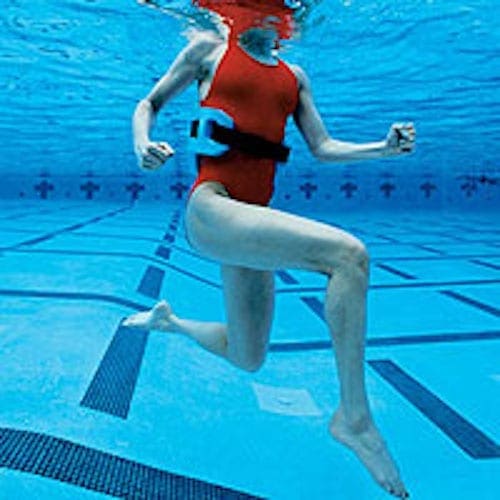This post originally appeared in January 2014, but we dusted it off in time for summer injury season—and pool season. If you’re trying to work through a bum body part after major summer mileage, turn to the pool for recovery.

Go ahead and kick it in. Pool running can be fun (really!) and most importantly, keep you strong while dealing with a running injury. Bonus: you just might get faster as a result, too. /photo from gotheextramilewithwoot.blogspot.com
A little about pool running:
When our bodies tell us to give running a break because of injury, the idea of giving up our beloved road or ‘mill sweat sessions is tough to swallow. Even our tried-and-true cross-training activities, whether Pilates or spinning, don’t necessarily feel like enough. (OK, not at all.) Which is why donning a swimsuit and hitting the pool may just be the answer.
Yep, experts say pool running is the best way for us to train while injured to maintain fitness. This is because it works all the same muscles that running does, only with added resistance of water. Even if we’re not injured, turning to water for its excellent fitness benefits and breaking from pavement pounding can prove beneficial: it can help prevent injuries in the first place since it is non-weight bearing and there is no impact on our bodies. And, unlike with road running, in the pool we can increase our mileage with less risk of injury.
Still, you might be wondering how exactly to make pool running work for you (read: how do I not get bored out of my mind). Like us, you might be curious about listening to tunes during a water-running workout (it can be done). Or how exactly you even run in the water. We turned to the tribe for insight and, as usual, mother runners didn’t disappoint. While you won’t need running shoes, you will want to get yourself a special around-the-waist flotation device, like the one in the picture above.
Here’s what else you need to know about pool running:
All things are not equal…and that’s OK.
Remember that actual running—and logging miles—is a different experience from miles accumulated in the pool. Says Jill B.: “I depressed me to add up all my laps at the end and realize I only did .75 of a mile, so I started just keeping track of time in the water.” It’s also good to gauge your effort level—your heart rate in the water won’t be as high as it is for land running due to the pressure of the water on your body and the cooler temperature of the water. But keep in mind that how you feel (your perceived effort) in the water will be higher than how you feel when you’re running on land.
Time flies when your mind is engaged.
Mother runner Jill B. has a waterproof iPod she uses. “Listening to podcasts and music certainly helped,” she says. Vicki B. mentioned a Lifeproof brand phone cover with headphone extender that could work well while Christi S. sang the praises of her Jabra wireless headphones that are weather-proof and allow you to leave your phone outside the pool. Other mother runners suggested pairing up with a water buddy—or the very least, get to know your fellow swimmers. “I ran in the pool after back surgery a few years ago,” says Kristen S. “I have never had such a great experience in my life. I went after putting my kids on the bus and the pool was full of retirees. I learn so many life lessons from these ladies, laughed way too much, and got a ton of new recipes! Go in open-minded.”
Mix things up.
Kelly-Ann S. runs in the water often and says varying your routine is important. “I also add in crunches while I’m there, and good old fashioned treading.” Try including a variety of workouts, just like your land-based runs. This could mean varying the intensity and time, or even running your favorite speed or fartlek workout in the water. You just may notice this translates to faster times on the road. McKenzie A., who took to the pool for eight months following an injury, says she loved interval work. “That broke it up and got my heart rate up.” Jill B. kept things interesting, too. “I would break it up doing intervals – run 8 laps, crawl 8 laps, kick board 8 laps, buoy 8 laps.”
Have you turned to pool running because of an injury, or to add something different to your fitness regimen? How has it helped you exactly? What tips do you have, leave us a comment!






Such an aptly timed blog post. It’s as if you’re reading my mind… ;-)
Check out two posts my sister wrote about water running:
http://wp.me/p3mJkj-9Y and http://wp.me/p3mJkj-9M
Water Running is a great way to add variety to marathon training. When I was injured I first started a water running class and love the way it saves my legs when the miles increase. It’s a great workout and fun. If you are gathering water running resources from different locales. Consider adding http://www.fluidrunning.com to the list for the Chicago suburbs. Jennifer Conroyd,it’s owner, and her program have been a huge asset to my long distance training.
I’ve been a long-time water runner, for injury recovery and for training variety. A cheap alternate to the waist buoy (which I find digs into my ribs) is a noodle – yes the kids toy – and ride it like a horse (place between your legs)! I find it keeps me buoyant enough & allows a free arm swing. The only caveat is that you need to wear some kind of thin mid-thigh level shorts or you will get a major inner thigh rash. Trust me on this one! I know from experience. : (. (Perhaps body-glide would work? Never used it).
For boredom busters… music & 1min intervals on& off help.
My running club encourages aqua-jogging for everyone–it’s not just for the injured! A lot of women in our group do it on active rest days, after a long run, it feels fabulous being in the pool.
Our biggest boredom busting tip is to do it with a group or a friend. It’s just inherently boring since you have to do laps. For us, it’s a great opp for women of different paces in our group to get to know each other.
Our rule of thumb has been 10 minutes = 1 mile.
Staying upright and having good form is important. It is so good for the core. We do sprints and intervals to mix it up sometimes.
More pool running tips:
X-1 audio makes great waterproof iPod shuffle cases/headphones, definitely a must for podcasts – or music – while pool running. I managed 2.5hrs pool running multiple times, around and around a small diving well area.
Go in circles, squares or the largest circumference of the area you’ve got – do laps, not back and forths.
Get your own floatation belt – they’re not that expensive and some pools don’t have very good ones.
Glad to see someone suggested Jennifer of Fluid Running – she’s terrific – helped me in my immediate post-injury panic, reaching out in a a really generous way…you really should have her on podcast! She’s got a terrific story, and she’s a mother runner with her own running related business (and she’s now training instructors also).
To maintain fitness – intervals.
Pftizinger plan for 9 weeks of pool running
http://www.runnersworld.com/race-training/nine-week-plan-staying-shape-while-injured?page=single
http://strengthrunning.com/2011/06/pool-running-why-you’re-doing-it-wrong-and-how-to-pool-run-to-get-faster/
http://wellimtryingtorun.blogspot.com/2010/01/pool-running-posts-listed-by-category.html
http://www.eatrunread.com/2011/07/best-pool-runningaqua-jogging-workouts.html
I actually got to enjoy pool running as I was rehabbing – more the longer slow sessions than intervals (but that’s similar to my running). Also, after a long hard run, a pool run or swim will do wonders to get the stiffness/soreness out of muscles, joints and tendons in a way nothing else does. It’s the compression and cooling of the water, and it really does help. I still try to get to the pool once a week on a XT day but I’m trying to swim a little now (told it’ll help VO2max) though it’s more tiring and sometimes I’ll just do a quick pool run instead especially if my limbs are tired from a hard running training week.
finding pools at home or on the road (also try your local park district, Y, health clubs)
http://swimmersguide.com/default.aspx?NID=160
great sites to buy swim gear (warning, you can rack up bucks this way, I did!)
swimoutlet.com
girls4sport.com – I have their neoprene shorts, nice
I am so cold in the water I bought a wetsuit jacket from swimoutlet and Lava pants (neoprene pants triathletes train in) from Xterra wetsuits. Cap, snorkel, lap counter, belt, fins, goggles, more goggles – oh yeah, if you’re near lap swimmers where you pool run you might want to wear goggles.
Rehabbing runners are a big population of the pool runners in my area – another bonus is I met cool people, got tips for docs/massage/chiro professionals, talked about races, learned about running teams & clubs. Make the best of it.
Best to all!
Since I just asked on the Facebook site how to train when in a walking boot, I’d like to think this post was just for me ;) So far, despite feeling ancient, my aqua runs have been fun/fine. I am a people watching and mind wanderer, so boredom hasn’t been an issue. Change it up with different techniques, like high knees. Great post!
This sounds like it could be awesome for those of us who are pregnant! Has anyone tried this? What do you think? I’m still able to go out and get some “shuffles” in around the neighborhood, alternating walking and jogging. I’m 5 1/2 months along right now, so the idea of low-impact (for lower back alone) sounds really nice. If you want to contact me directly, I’m at Mamathoner on facebook!
Going into training for last year’s NYC Marathon, I was still dealing with peroneal and posterior tibial tendonitis. I substituted 1 short (3-4 mile) run per week with a pool run. As suggested above, I did the pool runs based on time (30-45 min) vs. mileage. I swear it saved me. I used a regular iPod Shuffle and clipped it to the ponytail holder on top of my head. It was a great workout!
Appreciation for another fantastic posting. In which more might everyone get that sort of information and facts in their normal ideal way of writing? I’ve a business presentation following full week, for on the search for similarly info.
You could certainly see your enthusiasm in the work you write.
The sector hopes for more passionate writers such as yyou who aren’t
afraid to mention how they believe. All the time follow your heart.
Here is my site :: get connected with a local personal injury lawyer – Holly –
I just spent 2 solid months in the pool waiting for knee surgery. Some helpful info: 1. Buy an Aqua Jogger belt. It helps keep you upright so you don’t sink. It’s great for your abs, too. You’ll have to consciously remember to pull them in!
2. Your pool mileage doesn’t translate to number of laps. Most people use their AHR pace to calculate miles.
3. People watching is excellent distraction. I didon’t my deep water jogging during summer swim team practice, water aerobics, and masters swimming.
Pool running was an essential component of my training for the Big Sur Marathon this past spring. I was battling PF and was in so much pain that it threatening to derail my dream to run my bucket list marathon. That was not happening. I didn’t have a time goal for Big Sur. I just wanted to get there. I was skeptical about how effective pool running would be but the results were astonishing. My legs held up well during the race, my foot didn’t bother me, and even the week after the race, I was able to hike through Yosemite with my husband. Yes, pool running is boring but it is so worth it!
Two months out from Boston this year, I tore my high hamstring and spent eight weeks in alternative training… I certainly wasn’t going to miss that marathon! I’d had the injury before and spent three months not running at all and then I run – walked my way back up to speed. That program was NOT going to be an option this time. I ended up doing 3 to 3.5 hour brick workouts of elliptical and pool running. When I was ready, I also did Alter-G treadmill runs (my last being an 18 mile mind-numbing will-tester). Long story short, my 4:25 Boston finish wasn’t pretty, but I would not have been able to get that without the time in the pool. My coach was kind enough to adapt my speed work to the water and that kept it more interesting. I still enjoy a good pool run when my body is feeling tweaky or just needs extra recovery. Wishing speedy healing to anyone suffering through an injury right now…hang in there. You’ve got this!
This is such a timely repost! I am currently 16 weeks pregnant with #4 and every pregnancy I’ve had, my body loathes running – this time no exception. A new gym with a pool opened in town and I’ve just been wondering if it’s worth it for me to try pool running so I don’t lose my running fitness entirely (again!). Anyone have experience pool running with pregnant? Will I look and feel like an awkward whale?
This is so timely! I love the helpful comments from two years ago too. I’ve just signed up for my first Fluid Running class on Tuesday–I’m so excited!!!